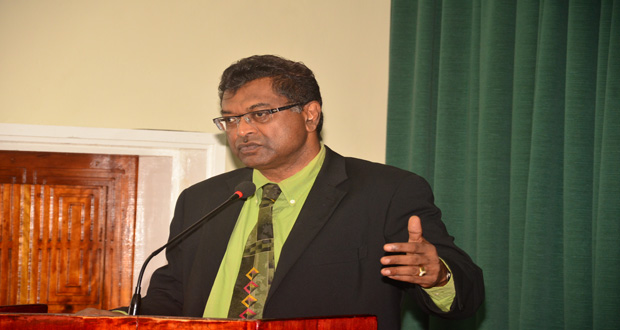March 30, 2016 Source

Minister of Public Security, Khemraj Ramjattan
UK group conducting needs assessment before SSRP roll out
A GROUP from the United Kingdom is currently conducting a needs assessment survey to help craft recommendations to advance a British-funded security sector reform plan, Public Security Minister Khemraj Ramjattan has said.
In an interview with the Government Information Agency (GINA), Ramjattan said the Security Sector Reform Action Plan (SSRP) is being advanced. He said following a meeting between President David Granger and Britain’s Prime Minister David Cameron, an agreement was reached for the programme to finally go ahead.
The minister said that because of objections raised by the previous PPP/C Government, the programme was shelved. “It would appear that the Government of Britain wants that thing to go on now, because they see in the new administration a different approach,” Ramjattan told GINA.
He added that a new assessment of needs will be undertaken, as the programme was due to be initiated some eight years ago. The needs assessment is being undertaken by the Olive Group, which has been contracted by the UK Government.
Ramjattan explained that interviews have already been conducted with him, several other ministers and officials in the sector, including the Police Commissioner, Prison authorities, and key Judiciary members.
“They have even asked how we can have a better parole system,” Ramjattan said. He said the process is to be completed soon and the Olive Group will advise on how the money allocated by the UK over the five-year duration, 2017 to 2022, should be spent.
British High Commissioner Gregg Quinn had told reporters here last year that steps are underway to ensure that the programme is revived, but he could not state the amount of money to be allocated to the programme.
Funding for the project in the past had come from the Department for International Development (DFID).
The US$4.7B project was scrapped in 2009 after the British Government had requested to have oversight of the programme to ensure that there was ‘value for money’. The former People’s Progressive Party Civic (PPP/C) Administration had disagreed with the manner in which the British Government had wanted the programme to be run, and had stated that the British had sought to intrude upon Guyana’s sovereignty.
In its defence, the British Government had said the Guyana Government had submitted a different proposal, which had focused on police modernisation rather than holistic approach to reform, as originally requested.
The British had proposed to build a workable basis for improving national security while reducing crime in Guyana by 2011. As a result, the British Government proposed the putting together of a national security plan with the aim of increasing public confidence.
Notwithstanding the many challenges faced during that period, Quinn is optimistic that the project would get off the ground. The Guyana Government has said it has interest in the recommencement of the Security Reform Programme.
Meanwhile, Ramjattan said: “The Security Sector Reform Action Plan is welcomed by the Government. We would really love to have that kind of support from the British, and we know that we are getting support from others, such as the Americans, the European Union, and Canada through the Justice Education Society — training our police men and women and so on.”
The UK security reform plan had sought to build the operational capacity of the Police Force in terms of a uniformed response to serious crime, as well as augment forensics, crime intelligence and traffic policing capabilities. The plan had also sought to strengthen policy-making across the security sector to make it more transparent, effective and better coordinated.
Bringing financial management in the security sector under the umbrella of public sector financial management reform, creating substantial parliamentary and other oversight of the security sector, and building greater public participation and inclusiveness on security sector issues were the other components of the plan.
